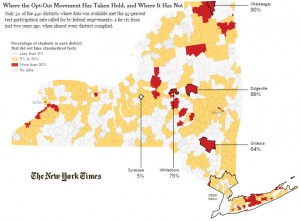
 The Common Core opt-out movement built up quite a head of steam this year. Although opposition to testing is hardly new, frustration over the Common Core standards, anger at Governor Cuomo’s budget power play over accountability and other factors spurred the formation of a large and diverse refusenik coalition.
The Common Core opt-out movement built up quite a head of steam this year. Although opposition to testing is hardly new, frustration over the Common Core standards, anger at Governor Cuomo’s budget power play over accountability and other factors spurred the formation of a large and diverse refusenik coalition.
State Education plans to use the tests anyway: “We are confident the department will be able to generate a representative sample of students who took the test, generate valid scores for anyone who took the test, and calculate valid state-provided growth scores to be used in teacher evaluations.” We’ll see. The Democrat & Chronicle reports the refusal rate for the math test was at least 25% for every Monroe County district but Brighton and Rochester.
 The issue resonated statewide. Many regions of the state reporting opt-outs well above 50%. The New York Times reported that only 30 of 440 districts responding to its query met the 95% threshold required by federal law.
The issue resonated statewide. Many regions of the state reporting opt-outs well above 50%. The New York Times reported that only 30 of 440 districts responding to its query met the 95% threshold required by federal law.
It’s true that we rely on far smaller samples to assess public opinion about issues great and small or predict elections for president (and parliament in the U.K.!). Credible polls are based on a random sample of the population, however, which this certainly was not. Moreover, district averages conceal considerable variation at the school and classroom level. Anecdotally, the refusal rate by school and classroom varied dramatically. Although it is hard to argue with the principle of using student achievement to assess teacher performance, the details are devilish indeed. It would be a mistake to rely heavily on these scores.
Talented and diligent statisticians at State Education may be able to make use of prior year scores from missing students to assess general trends. No amount of creativity can create a credible classroom “growth score” with only half the scores. And this problem has legs—Even if the opt-out movement fizzles next year, State Ed will be missing 2015 scores to use in 2016 growth scores.
| Learn more about NYS Common Core & testsTest manuals for Admin & Teachers |
Last month’s column triggered an email conversation with an old friend, a parent who chose the opt-out path. While we didn’t convince each other, the nature and breadth of her concerns helps explain why the opt-out coalition was so large. Here’s an edited version of our back-and-forth:
ME: Did I hear that you’ve joined the opt-outs?
FRIEND: I like Common Core standards, and I like the curriculum our school district uses. I have no problem with my kids taking tests. I also want teachers held to high standards, and I was in no way swayed by the teachers union.
Last year my 8-year-old sat through 9 hours of math and ELA testing, plus a full 9 hours of “practice” testing. Why do you need to practice for a test? It takes 9 hours to assess an 8-year-old’s competency level in math and ELA, but what, 3 or 4 hours for a HS kid to take the SAT?
Then there is the grading, and the months to get the results, and the question about what a “4” really means. The scoring seems deliberately opaque. By the way, [daughter] scored a 4 on ELA and a 3 on math, so it’s not as if she can’t succeed on these things.
The tests are way too long for younger kids and not that well written. Some questions seem fine, but some are truly bizarre.
Then there is the connection to teacher evaluations. I’m not wholly convinced it’s the teacher’s fault or to their credit if a kid scores low or high.
My kid, while a high performer, has test anxiety. When I told her she did not have to take these tests this year, a weight visibly lifted off her shoulders. For me, it’s a year by year decision. After balancing both sides, for my kid, for this year, opting out is the right thing.
ME: I am angry about the fact that the Grade 3-8 tests AREN’T high stakes for the children, only for the adults. We adults ought to be able to avoid shifting our stress to them. The Regents exams make a difference for the children, sure. But not the elementary tests.
FRIEND: I can tell you that many 8- and 9-year-olds in the elementary schools are scared of these things. It didn’t come from me in my household. Last year I was only superficially aware of the tests until [daughter] came home quite freaked out by them. The teachers claim they don’t make a big deal out of it, yet the kids figure it out. Doesn’t matter how many times we tell them it’s to test the school and the teachers, not to test you. (Then again, why are our kids going through 18 hours of tests for something that has no stakes for them??)
 I suspect every parent who is opting out has slightly different reasons for opting out. Some people believe Pearson [the private company that manages the testing] is gathering personal data on our kids, that it’s all about the money. Some people believe Cuomo is in bed with wealthy finance folks who want to invest in charter schools for the tax breaks. Some say the tests are crap. Some of us just think NYSED should be more developmentally appropriate when it comes to using our young children to measure the performance of teachers and schools.
I suspect every parent who is opting out has slightly different reasons for opting out. Some people believe Pearson [the private company that manages the testing] is gathering personal data on our kids, that it’s all about the money. Some people believe Cuomo is in bed with wealthy finance folks who want to invest in charter schools for the tax breaks. Some say the tests are crap. Some of us just think NYSED should be more developmentally appropriate when it comes to using our young children to measure the performance of teachers and schools.
Couldn’t they phase them in? One hour in grade 3? Two hours by grade 5, nine hours by grade 8? If they do become more reasonable, maybe we’ll opt back in next year.
I’m looking at this as a parent, not as a policy analyst. My kids both participate heavily in academics, sports, and music. They are tested and evaluated ALL the time. This is just different. I’m surprised I came to this decision. Without a kid in grade 4 I’m not sure I would have arrived at the same place.
There is a lot of practical wisdom here. She says “yes” to a rigorous curriculum, “yes” to assessment, “yes” to accountability. But we live in an imperfect world. In an effort to make the assessments more reliable and our accountability more rigorous, we’ve stepped over some invisible line. And for a host of reasons, many parents have said “Enough already.”